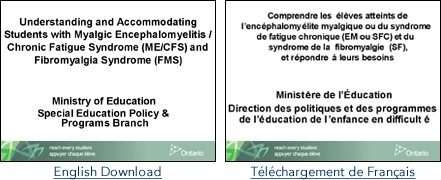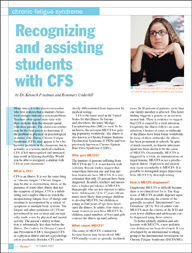 | ||
|
|
Managing with School School plays such of an important role in the lives of children not just because of the knowledge gained but because of social experiences accumulated from interacting with other children and the teachers. The aim is for well-adjusted as well as well-educated adults. The unpredictability of the physical symptoms as well as the cognitive problems of children with M.E./CFS can make attending school on a regular basis very difficult. As soon as a child is diagnosed with M.E/CFS, advocates for the child (usually the parent) should approach the schools to explain the nature of the illness and how it affects their child. It will probably feel like your school doesnt know a great deal about M.E./CFS and you may feel frustrated if they arent aware how many children are sick with M.E./CFS and what these students need. YOU ARE NOT ALONE. Many parents go through this and you will likely have to spend some time educating the educators. Our parents tell us everything goes smoother if you start off trying to help them learn and establish an attitude of mutual cooperation. Then they can jump in and show you the systems for home-schooling or part-time education that are available to all disabled students. The first meeting is usually with the school principal, vice-principal or head of guidance, where different accommodations can be discussed. If a child will be home-schooled entirely, they can help you with lesson plans. If a child can attend some classes, a meeting with all teachers involved is important too. Of course a letter from the child's doctor can be very helpful and is usually necessary to medically verify the childs illness and limitations. Teens who become ill in high school sometimes try to handle the interactions with the school themselves but in most cases they do not get the help they need because they usually look healthy and are not taken seriously. They also need an adult advocate, whether it is their parents only or a parent and a school representative a guidance counsellor or social worker. A teen with M.E./CFS has enough on their plate just trying to get better and to take whatever courses they can, without having to advocate non-stop for their own education. However, work this out with your teen so he or she feels respected when you fight on their behalf. The MEAO has a small brochure for Youth with Chronic Illness that you will find in our Resources below. Accommodations for youth with M.E./CFS depend on each individual and the severity of their disease. They can vary over time as is shown by the following example of an 18-year-old Ontario boy who has been very ill with M.E./CFS for 12 years. In primary school he was in school full time but missed 35-40 days per year. The parents worked with the child at home to make sure he kept up with the school work. Wherever possible he was allowed to participate in field trips even if it meant that he would be sick for the next few days. By the end of Grade 7 he had a severe relapse and could not go to school for his entire Grade 8 year. At first the parents, with fantastic cooperation from the teachers, taught his subjects at home, but eventually they taught only Math and Science and the school board provided a tutor for an hour per day for the other subjects. The tutor was very flexible because many days the child was too ill to manage a lesson. During this year friends visited him and he sometimes went to their home. He managed to go to school the night of his graduation. In high school he was able to attend school but with a reduced load (2/3). He missed 20% of his classes but the parents would bring the work home and help teach him or for some subjects they hired a tutor. He was always given extra time for tests and exams. Often he needed extra time for completion of assignments. In some classes he had a student take notes for him. He sometimes went on field trips and to dances. He took a 'non-active' health course in Grade 11 instead of the mandatory Phys. Ed. requirements for graduation. All this was done with amazing cooperation with the teachers. The parents were not making excessive demands on the teachers' time, only asking for understanding and coordination. As he became known to the teachers, he was able to handle most of the interactions by himself and the parents were much less involved. By Grade 12 and OAC he had another relapse and the school board provided a home tutor for one subject (Math) and he attended school for one subject in order to keep the contacts and the social balance. During his high school years he also learned some strategies used by learning-disabled students to be more efficient with this limited energy. One particular useful aid was books on tape. He was permitted to use CNIB talking books from the library (due to physical disability) and occasionally his mother taped an important book not available elsewhere. Accommodations within the school system and strategies to compensate for the limitations of M.E./CFS will vary with each individual. Attendance at school wherever possible helps to minimize the disruption of normal social development. This might mean only getting to school part-time but it gets the children into the school with their peers. If at times the symptoms are too severe and the child must be home, then home-schooling helps keep them up with their studies and parents can try to arrange other ways for children to socialize with their peers. Of course some parents are not able to teach their children like the parents in the above example. And some parents cannot afford to hire tutors. They might need more help with educational resources provided by the school and school boards. In Ontario, the Ministry of Education recognizes Myalgic Encephalomyelitis and Fibromyalgia as health disabilities requiring special accommodation. The MEAO is working to establish new detailed guidelines for teachers and school boards, but any parent right now can request special help for a child with ME or FM from their school. Since 2004, the MEAO has distributed kits to more than 200 school boards, schools and other educators. Our package includes some of the resource we have placed on our website for you (see below) as well as the wonderful resource book called Teach Me: Second Edition. You can read about this book below and order it from the National ME/FM Action Network. We want to hear from you! Some parents have experienced difficulty with their schools. If you are experiencing difficulty, please call our Info Line and let us know a little bit about your situation. One of our parent/youth volunteers will call you right back and we will try to help you and your childs school. Children with disabilities have the right to be helped! And it is important to remember that having M.E./CFS does not exclude the possibility of other pre-existing learning disabilities which must be addressed in addition to the illness. This is much easier to assess in children that become ill at a later age, where learning patterns have already been established, but dont forget to have your child assessed for learning difficulties at any age if you feel the M.E./CFS does not explain all of their learning difficulties. Managing with School – Resources for Parents and Educators The MEAO and the National ME/FM Action Network have spent many years working with the Ontario Ministry of Education, and with school boards and schools across Ontario. Each year the MEAO talks to about 60 families about their needs, and we know that there are many more families we could help. Below are some resources you should find helpful if you have a child in school with M.E./CFS, and don’t forget to check out our other website sections under “Youth and Parents”: Ontario Ministry of Education materials in English and French: The Ontario Ministry has worked with community groups to create the following slideshows in English and French, for all educators in Ontario. They have already shared these documents with each of the school boards and the MEAO is working with the Ministry to have them available to all schools and teachers through a central government website. The slideshow is in PowerPoint in its original format, but we have converted it to a PDF document for public use. If you are a teacher and want access to the PowerPoint slideshow, you can contact the MEAO by phone or email and we will send it to you.
Getting Help from the Ministry with Curriculum Changes: Students who need curriculum changes due to illness can request substitutes in many cases. Parents can check out the Ministry of Education’s guidelines on substituting courses online and then talk it over with their child’s school. For more information see the Ministry of Education's website: Section 3.2 ("Substitutions for Compulsory Courses"). The NJEA Review, October 2007 – a Good Article for Parents/Teachers One of the clearest articles on the issues facing young students with M.E./CFS is called “Recognizing and Assisting Students with CFS”. Just click on the image below to read this article. The Teach-Me Sourcebook for Parents and Educators The Teach-Me Sourcebook is a wonderful guide for parents and educators and is available from the This handbook is over 100 pages long. If you are a parent of a child with M.E., or you are a teacher or educator, this guide offers a comprehensive look at the topic of M.E. and young people. We encourage you to purchase a copy of the Teach-ME Sourcebook. Inside you will find chapters on the following topics:
Helping Teens Live with Chronic Illness: In 1995, the MEAO wrote a short booklet for teens and their families about the general emotions and issues young people face living with M.E./CFS for many years. While some teens recover in six months or a year, and most recover within two years, it is still difficult living with a chronic physical illness. And since some teens may take many years to recover, it is important that their emotional as well as their physical needs are addressed. This booklet was written before much was known specific symptoms in youth, so the focus is on emotional needs, when to advocate for teens and when to let them lead the way, and other social issues. Just click on Youth Living with Chronic Illness to read this booklet. |
|
 | ||

